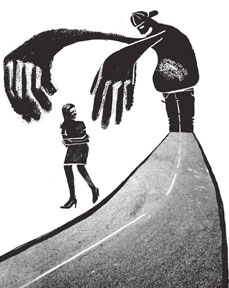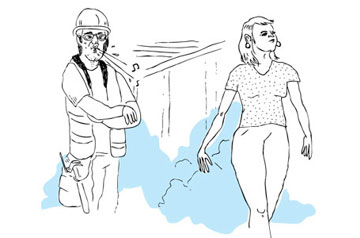Take a walk in a Woman's shoes
By Kathya De Silva Senarath

 |
| Dr. H.R.S.
Keerthisinghe |
 |
| Dr. Sepali
Kottegoda |
If a man thinks that whistling, clapping, catcalling or brushing
against a woman when she is on the streets is “innocent fun” or “paying
her a compliment,” he is completely delusional. It is time to wake up as
this is sexual harassment punishable by law.
Shanthi, a bank employee, was walking to office on the sidewalk on a
Monday morning when she was whistled at and called ‘baby’ by a group of
men leaning against the wall. She felt embarrassed and objectified, and
tried to walk away before anyone heard them. But the more she ignored
them, louder came the whistles and calls making Shanthi quicken her
steps on the sidewalk. Knowing she was trying to escape them and seeing
nobody else around, the group started following her, telling her to look
at them and smile.
Unable to bear this harassment any longer, she took up all her
courage and shouted: “Leave me alone. Get away from here before I call
the Police.” Then there was a storm of sniggering and shouting, with
remarks that was sexual and almost violent.
Fortunately for Shanthi, she came to a more crowded area which made
them retreat. She never took the route again and found an alternative
route which took her longer to get to work.
Shanthi never feels safe on the streets again.
It is impossible to find a woman who has not experienced any sort of
harassment in a public place at least once in her life. Girls and women
are traumatised on a daily basis, be it walking on the street,
travelling in the bus or simply waiting for public transport in a
crowded place. Either a bystander’s creepy stares, honking from a
passing car or being leaned against in a crowded bus, women and girls
are often objectified and threatened in public places. This reality of
sexual harassment and violence against women limits their opportunity to
enjoy the freedoms, enjoyed and taken for granted by men. Street
harassment limits a woman from being able to enjoy her own neighbourhood.
 |
This is largely a neglected issue. Although laws are in place to
protect women, they are not implemented properly as cases of street
harassment are considered to be trivial. Women rarely get the attention
from the Police when they make an effort to report incidents. As a
result they tend to take the law into their hands as was the case in the
Wariyapola incident where a girl expressed her anger by slapping the man
who harassed her.
Entitlement
The Wariyapola incident, particularly the way the victim responded
has given light to many issues so far conveniently brushed aside by
society. Many were blaming the victim and judging the level of
punishment given to the harasser by her. But who has the right to judge
when it was her body and her privacy that were thus violated? Is it
right to decide the number of slaps the man should have received when it
was she who lost the entitlement to her own body, objectified crudely by
a man who has been allowed by society to believe that it was his
inherent right? “Boys will be boys” is the excuse that society gives for
men who degrade women.
Almost all women who have been victimised on the streets would agree
that anger and shame are the first feelings to wash over when you feel
that the privacy of your body has been violated. They are disempowered
and felt helpless by the sexual harassment exerted on them, turning
sometimes into violent outbursts which they may feel is the only way of
‘claiming’ their body back.
The Sunday Observer asked Consultant Psychologist Dr. H.R.S.
Keerthisinghe the causes that lead to sexual harassment of women on the
streets. “The collapse of the family unit with the breakdown of
interactions based on love and respect within the family is a main cause
that leads to sexual harassment of the opposite sex,” Dr. Keerthisinghe
said.
 “It is natural that men and women are attracted to each other. But
when a person does not have a good relationship with his family members
and when he cannot find a loving relationship with a partner, he
searches for ways to unleash his desires. He would seek pleasure by
brushing against a woman or passing comments which become a harassment
for women who reject these advances,” he said. “It is natural that men and women are attracted to each other. But
when a person does not have a good relationship with his family members
and when he cannot find a loving relationship with a partner, he
searches for ways to unleash his desires. He would seek pleasure by
brushing against a woman or passing comments which become a harassment
for women who reject these advances,” he said.
Dr. Keerthisinghe added that members of the family must set an
example to their off-spring and teach them from their younger days to
respect others. Schools must take a more active role in teaching
children ethics and about respecting others. When children are not
taught moral values and ethics, they could become harassers in later
life, he said.
Dr. Keerthisinghe also stressed that schools must teach their
children, especially girls, on how to reject inappropriate advances.
“When girls experience sexual harassment in the bus, they should learn
how to say no and get away from the situation. If they keep quiet, the
harasser may think that his advances are accepted and will continue to
behave in the same manner. Girls must be told that they need not feel
frightened and be encouraged to voice rejection,” Dr. Keerthisinghe
said.
Executive Director of the Women and Media Collective Dr. Sepali
Kottegoda told The Sunday Observer that almost 99 percent of street
harassment is against women.
Policy
“We should refer the policy frameworks with regard to protecting
women against sexual harassment. It is clear that any kind of sexual
harassment against women, be it domestically, at a workplace or on the
streets is unacceptable. The rights of the person who is being
victimised must be recognised,” she stressed.
“There should be an assurance of accountability from those operating
public transport. Also, an informed response from the general public is
needed to protect women in public places. It is never ok to sit and
listen or look the other way when women are being molested in the bus.
It is not her fault, whatever attire she may be wearing,” Dr. Kottegoda
stressed.
An unfortunate fact about street harassment is that men, even those
who are educated and in privileged positions in society, and do not
intend to be perverts, end up being one for not being able to
communicate with women properly. The lack of knowledge and skills to
communicate lead them to offend and degrade women. Some actually believe
that whistling and catcalling is an appropriate way to show interest in
a woman.
Dilan is an undergraduate and vehemently refuses to accept that
whistling and catcalling count as harassment. “If I see a woman I like,
I might comment on what she is wearing and might even block her way to
get noticed,” he said. Asked if his tactics worked, he said women
usually ignored him as they were in a public place. Dilan seems to think
that their reaction would be different if he had approached them
elsewhere.
 Neela, also an undergraduate, was walking on the street with two of
her male friends when a girl passed by. Automatically, the two started
humming a song aiming at the girl. As soon as the girl passed them, the
two started laughing and passing comments at the girl who ignored them
and went on her way. Neela said even though she did not know that girl,
she knew exactly what that girl must have felt and was embarrassed of
her friends’ behaviour. When she confronted them, she was told to
lighten up as they are being ‘men’ and were only ‘having some fun’. They
weren’t bothered that their fun was at the expense of an innocent
passer-by. Neela, also an undergraduate, was walking on the street with two of
her male friends when a girl passed by. Automatically, the two started
humming a song aiming at the girl. As soon as the girl passed them, the
two started laughing and passing comments at the girl who ignored them
and went on her way. Neela said even though she did not know that girl,
she knew exactly what that girl must have felt and was embarrassed of
her friends’ behaviour. When she confronted them, she was told to
lighten up as they are being ‘men’ and were only ‘having some fun’. They
weren’t bothered that their fun was at the expense of an innocent
passer-by.
“The way a woman is dressed does not tell you if she wants to be
commented on. If she looks dressed up, do not assume it is to gain the
admiration of all men she sees and that you should say something to her.
She may enjoy dressing up, she may be dressed up for an event, or she
may be dressed up to gain the admiration of a specific person or
persons. Unless she has a sign on that says, “Please comment on my
looks,” do not do it,” says Stop Street Harassment (SSH) organisation
which is committed to bringing awareness on street harassment.
“Stranger rape and harassment are real threats for women. If you find
yourself alone with a woman in a deserted parking garage, road, or park,
especially at night, keep a respectful distance and do not approach
her,” it adds. “Treat women like human beings, with respect and
dignity,” it says.
“Unless the comments or actions of men who want to flirt or meet a
woman in public to date are welcomed by the woman, they constitute
harassment,” SSH says.
Commentary
Shenali, an executive at a leading private firm expressed her views.
“Keep your commentary, and your hands, to yourself. Don’t give the
excuse of ‘biology’ saying men are behaving that way because it’s their
nature. Don’t make biology an excuse to treat women with disrespect,”
she said.
“Street harassment does not depend on the way someone is dressed,”
Sithara, a teacher added. Even if a woman is wearing a saree or the
traditional Kandyan and covered from head to toe, there will be men who
pass lewd remarks targeting them on the street,” Sithara said. “Some
people blame the victim for receiving street harassment. We are a
society that blames the victim, especially in sexual harassment cases.
The incident at Wariyapola is one such case where the girl was targeted
again and again for slapping a man who deserved a good slapping.
The girl was victimised again and again, blaming her for her
reaction. But issues of street harassment were not given a place for
discussion," she said.
"People were more offended by seeing a girl slap a man, rather than
taking it as an act of bravery on the part of the victim who stood up
against harassers," Sithara said.
"If you are interested in a woman who walks on the street and want to
initiate a conversation with her, whistling, honking or making kissy
noises are not the way to get a woman to notice," said Roshini, a
journalist. "Instead you can smile and nod, and say hello. Behave in a
non-threatening and friendly manner. If she responds positively, then
initiate an adult conversation without making her feel objectified," she
said.
According to Bernice Sandler, a senior scholar at the Women's
Research and Education Institute, USA, some men have difficulty
understanding which behaviours are considered as sexual harassment. It
is helpful to assess one's own behaviour or someone else's by asking a
few simple questions, she says.
Would I mind if someone treated my wife, partner, girlfriend, mother,
sister or daughter this way? Would I mind if this person told my wife,
partner, girlfriend, mother, sister or daughter what I was saying and
doing? Would I do this if my wife, partner, girlfriend, mother, sister
or daughter was in the room? Would I be comfortable saying the same
thing or acting the same way to my mother, sister or daughter? When a
person objects to my behaviour do I apologise and stop, or do I get
angry instead? are some questions you can ask yourself if you are
doubtful of your behaviour and do not wish to offend anyone.
"Most importantly, you must observe whether your behaviour is
reciprocated and whether there are indications of pleasure. But, the
mere fact that 'she didn't object' cannot be taken as she reciprocated,"
Sandler says.
There are several ways that women can handle a stranger's harassment,
either by embarrassing him in public by raising your voice or reporting
him to law-keepers. The Private Transport Services Ministry has
introduced a new hotline to lodge complaints against errant bus crew and
sexual harassment in public transport. Victims can call 0716550000 or
contact through Skype ID 'private transport services'. However, most
women are uneasy when the harassment comes from a person they know or
from a colleague at work. Sandler says that individuals often need an
array of their own strategies to use when sexual harassment strikes and
gives useful tips on how to deal with sexual overtures, sexist remarks,
sexual jokes etc.
Recognise
Many people who experience sexual harassment and feel uncomfortable
may initially not recognise the behaviour as sexual harassment. Women
may deny the behaviour by saying "I'm sure he didn't really mean it," or
"It's really no big deal," or "I must be imagining this." Sometimes if
the harasser is a respected person, someone in authority, or a close
friend, denial and shock may set in so that the person who is harassed
is simply unable to deal with the incident(s) for several days or weeks,
according to Sandler.
One way of dealing with it is to talk directly with the harasser if
you are comfortable. Sandler says the "Miss Manners Approach" is a good
beginning. "I beg your pardon!" This, coupled with strong facial
expressions of shock, dismay and disgust can be used whenever you cannot
think of anything else to say or do.
Naming or describing the behaviour is also a good approach. Saying
"that comment is offensive to women; it is unprofessional and probably
is sexual harassment," and making it clear that behaviour has to stop
would definitely make life easier. Sandler says pretending not to
understand is particularly useful with sexist or sexual remarks and
jokes. "You keep a deadpan expression and state that you "don't get the
point of this" or "I don't understand what this means. There is nothing
worse for a joke-teller or someone who thinks he or she has made a
clever remark than to be told that someone didn't "get it," Sandler
says.
Using humour is also a clever way of dealing with harassment, adds
Sandler. Yet, sometimes in an attempt to cope with sexually harassing
remarks, women may laugh at the harasser's behaviour, joke back at the
harasser, or initiate sexual joking or a sexual discussion. Sandler says
this behaviour is rarely successful in stopping sexual harassment
because the harasser does not recognize that the behaviour is not
welcome by the woman and thus continues the behaviour.
Pretending to take down the harasser's comments in a notebook and
making a big show is also another way to scare him off. "If asked why
you are writing things down, you can blandly say, "I'm just writing
things down" or "I'm thinking of writing a book about sexual
harassment," says Sandler.
The most important thing is not to ignore sexual harassment hoping
that it will go away. The more women ignore it, the more likely it may
recur. It would also give the wrong message to the harasser that the
victim approves his behaviour. However, it is wise to ignore sexual
harassment when you feel unsafe and alone, says Sandler. "Your first
priority is to get out of the situation and go somewhere else. You can
deal with what happened later," is her advice.
Anonymous
Talking to your peers would be an option if talking directly to the
harasser has not helped or if you are not ready to go to higher
authorities to report the harassment just yet. Send a copy of your
institution's policy or other materials regarding sexual harassment to
the person who is making you uncomfortable, signed or anonymous, with
the appropriate sections underlined. Victims can talk to a counsellor or
other professional if they experience stress. If the strategies so far
adopted are of no avail, it is best to report it in a formal complaint.
Taking along a friend with you would make it more comfortable, she adds.
Street harassment or any kind of sexual harassment is not a
compliment on women, no more than rape is about sex. They are all real
threats faced by women on a daily basis. Harassment of women is about a
statement of power and control, to intimidate and dehumanise women. It
is an exercise of a perceived right to the bodies of women, to discuss
and claim ownership of, extended even to school girls who are harassed
on a daily basis on the bus, train and school van, mostly by men twice
their age, fit even to be their fathers and grandfathers. Society needs
to debunk the myth that street harassment is 'harmless fun', that it is
just 'boys being boys' or that 'women should take it as compliments.'
Instead men should step into a woman's shoes and take a walk on the
streets.
Then, think of the mothers, sisters, wives and daughters who take
this walk every day. |

